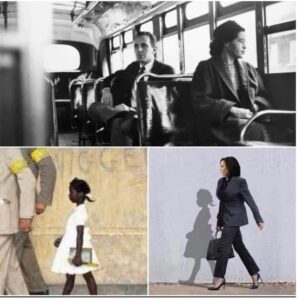Dear Friends,
As we celebrate Black History Month this February, I want to share why this time is so important to me, as a human who lives in a cis-gender, white-skinned body, and as a leader, daughter, sister, and mother. First, my lived experience has taught me that the recovery of lost or under-told stories is an act of service to all of us—helping to make our collective memory more nuanced and complete. Over the years I have been fond of saying that “the stories we tell shape the futures we have available to live,” and this sentiment rings more and more true for me year by year. What we tell ourselves is possible or not, positive or not, or even “political” or not affects both what we believe we can do and shapes what we believe should be done.
As I have reflected on the meaning of this month, at this particular moment in our history, four themes kept surfacing:
- That representation matters because when we see people we can identify with doing things that we might like to do, or that make an impact in the world in ways that matter to us, we can more easily imagine ourselves there too.
- That remembering matters because the things that happened before we got here still shape our experiences of today and knowing that history in a well-rounded way helps us both understand our current circumstances, and appreciate the effort that all progress takes.
- That recognition matters because too many people have toiled for too long in the shadows—doing things and dreaming up ideas that fundamentally changed our collective experience and without recognizing the effort that took, we make it harder to tackle the next challenge.
- That research matters because being well-informed is both an individual and a collective responsibility. It isn’t the job of people on the margins to educate or inform those who most benefit from things as they are—we must each do our own work and seek out new information.
While I always use this space to set the stage for our newsletter, today I want to use it to celebrate just a few of the reasons why remembering, and elevating, the exceptional stories of Black Americans, matters for us all.
Representation Matters
As Kamala Harris made history last month as the first female, first African-American, and first Asian-American to be Vice President, images of proud brown-skinned girls and women began to flood media outlets with “My VP Looks Like Me” messages—a powerful reminder that “seeing it” is an important step on the road to “being it.”

As we celebrate this historic moment, it is also worth appreciating the many women who blazed the trail by running for President or Vice President as far back as 1872—including both Shirley Chisolm and Carol Mosely Braun who ran for President in 1972 and 2004, respectively. Who we see in what kinds of roles and positions shapes our belief in what is possible, but also informs what we think of as “good” or normal. See what these teens have to say about why representation matters in the media.
In 2016, after Hillary Clinton lost the Presidential election by the thinnest of margins, my then 8-year-old daughter looked at me and said “7 more elections until I can run, right?”—she had done the math in her own young mind, and had no doubt that if that was a thing she might choose to do, that she could make that choice. Representation matters because all of our children deserve to have that same faith.
Remembering Matters
Another important reason to recover the stories that have been under-told is that when we erase people’s accomplishments, we not only do a disservice to their contribution, but we skew our collective sense of how things came to be as they are. Oprah Winfrey has collected a series of stories on unsung African American heroes here, and we encourage you to dive into all of their stories, but want to highlight just a few for you here today.
Most people have heard some version of Rosa Parks’ story of galvanizing the efforts to desegregate public transportation when she refused to give up her seat on a Montgomery, Alabama bus. This story is often told as one of a poor, tired old woman who was just worn out at the end of a long day. What the story misses, though, is Claudette Colvin’s story of having taken a similar stand at age 15 and being arrested for it—or how, as a long-time active member of the NAACP, Rosa Parks was a savvy activist and organizer who was able to recognize the opportunity and seize the moment when her “day on the bus” arrived. Parks herself would later recall “that her refusal [to get up] wasn’t because she was physically tired, but that she was tired of giving in.”
 Another popular meme since Vice President Harris was nominated, draws a historical line between Rosa’s protest on the bus, Ruby Bridges’ integration of schools, and the Vice President’s ultimate ascension to the second-highest office in the country.
Another popular meme since Vice President Harris was nominated, draws a historical line between Rosa’s protest on the bus, Ruby Bridges’ integration of schools, and the Vice President’s ultimate ascension to the second-highest office in the country.
While worthy of celebration, this telling of the story makes the “long arc of history” look like it is somehow linear and that progress is inevitable—and makes invisible the decades of struggle and the many lives lost along the way.
It also makes it harder to see how contemporary movements like Black Lives Matter is a natural progression and extension of earlier civil rights efforts and how the causes being advocated today emerged from a complex and long history.
In 2014, when Tamir Rice was shot dead by a police officer at age 12 for playing with a pellet gun in a park across from his home, I had many conversations with my then 10-year old son about “playing with guns” and the responsibility that comes with doing so in a white body when boys in black bodies don’t have the same freedoms. I remember those conversations vividly, and am also reminded that Black parents have to have a different version of “The Talk” with their kids much earlier and in harder ways.
Recognition Matters
While still unfamiliar to many, Katherine Johnson, was a pioneering mathematician for NASA whose calculations helped put an astronaut into orbit around the earth in 1962. Unsung for decades, her story was finally popularized in the 2016 film Hidden Figures.

She passed away in February of 2020, but has finally been memorialized in the most fitting of ways: “Northrop Grumman is naming the NG-15 Cygnus spacecraft the S.S. Katherine Johnson for her pivotal role in making human spaceflight possible… Scheduled to launch on Feb. 20, 2021, from NASA’s Wallops Flight Facility in Virginia, about 100 miles from where Johnson calculated trajectories for America’s first crewed spaceflight, first crewed orbital spaceflight, and the first Moon landing. The craft will carry supplies, scientific research, and hardware to the International Space Station.”
More recently, Inaugural Poet Amanda Gorman, became the youngest person in history to hold that distinction. While many of us were awed by her moving poem “The Hill We Climb”,—the story of her as a young black woman, raised by a single mother, and plucked from obscurity for the occasion doesn’t do justice to the many hills she had to climb along the way—to become a distinguished author and poet, to attend Harvard University and graduate Cum Laude, to find her unique voice at a time when everyone has an opinion and a platform for making it known.
Here she is reading her iconic poem at President Biden’s Inauguration and elevating the untold stories of local heroes in “Chorus of the Captains” before the Super Bowl this past weekend.
As leaders, recognition is one of the easiest, most inexpensive, but fundamentally meaningful things we can do. Who do you appreciate, for what? Are the things that get publicly noticed the things you most want to be “iconic” in your organization? What else might you do to draw attention to the things that represent the best of who you are or who you want to be going forward?
Research Matters
As I wrap up this letter, I feel the weight of having just barely scratched the surface of so many moving stories and noteworthy elements of our shared history. I’ve included a few links below to sites I have found helpful for expanding my own awareness and learning and encourage you to find your own as well…
Unsung African American Inventors
Little Known Facts About Black History
Influential Black Executives
African American Influences on American Music
African Americans Featured at the National Gallery of Art
Black History Month Resources
Perhaps the most important aspect of any exercise in remembering is the simple act of noticing how much there is that we don’t yet know and taking responsibility for filling our own void and seeking out answers to our own questions. We’d be happy to hear what each of you has been exploring, and how you are evolving your own learning and leadership… please pass your recommendations along! Finally, if you are a leader looking to go deeper and address Diversity, Equity, and Inclusion more directly at work, please consider applying for our 6-session, cohort-based learning experience. We’re accepting applications until February 19th and the program kicks off in early March.
In solidarity,


